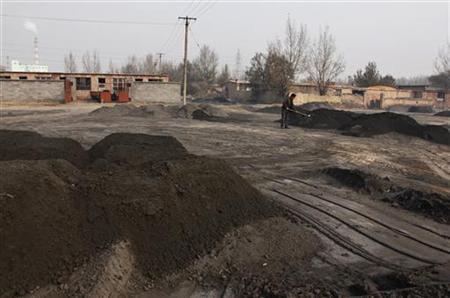'No embargo' of rare earths on Japanese firms
 0 Comment(s)
0 Comment(s) Print
Print E-mail China Daily, October 30, 2012
E-mail China Daily, October 30, 2012
Exports decline due to sluggish economy not islands: Expert
Declining exports of rare earths are due to sluggish global demand and not tension with Tokyo, industry leaders said.
|
|
|
China supplies more than 90 percent of the world's rare earths. [File photo] |
The drop in exports to Japan reflects a general trend, Liu said, adding that exports of rare earths may experience an overall decline this year.
Exports were 9,967 metric tons between January and September, according to the China Customs Statistics Information Center.
That means, Liu said, only one-third of China's 2012 quota of 30,996 tons, had been used.
Export volume dropped 11.5 percent from a year ago and was valued at $702 million, a sharp fall of 61.5 percent.
At 10,000 tons for the year, exports both in volume and value are expected to be the lowest in a decade, said Chen Zhanheng, deputy secretary-general of the China Rare Earths Industry Association.
Prices, after dropping for 14 consecutive months, may fall further, Chen added.
China planned to export 30,258 tons of rare earths last year but actual exports amounted to only 18,600 tons, or 61 percent of the quota.
China supplies more than 90 percent of the world's rare earths, critical to the manufacture of high-tech products, with about one-third of the world's total known reserves.
Output has been reduced since 2006 to conserve scarce resources and further protect the environment from mining damage.
Japan, the United States and the European Union lodged a joint complaint to the World Trade Organization about these measures in March.
Japan, the world's largest importer of the precious metals, has reduced its use of China's rare earths, from 80 percent a few years ago to 56 percent last year, Chen said.
Japan is also seeking alternative supplies from United States and Estonia. But, Chen said, neither country could meet Japan's demand.
Smuggling is also a major concern, Chen said. Record-ed imports by countries of rare earths were 1.2 times higher than exports recorded by the General Administration of Customs.
The lower-than-expected results of the first three quarters signal a steep decline in exports this year.
"The lower the price, the longer potential buyers will choose to wait," said Du Shuaibing, an industry analyst with Baichuan Information, which focuses on analyzing raw materials markets.
Mining operators and downstream producers have adopted a more conservative approach to cope with weaker demand.
There are an estimated 300 enterprises related to the extraction and exports of rare earths nationally. Many are running below capacity, industry experts said.
China's largest rare earths producer, Baotou Steel Rare-Earths (Group) Hi-Tech Co, halted roasting and smelting for a month to stabilize prices.
Its net profit went down almost 90 percent to 120 million yuan ($19 million) in the third quarter, compared with the same time last year.
Gao Wei, general manager of Shanghai Huaming Gona Rare Earths New Materials Co Ltd, said his company is having "a very tough year". "Our sales have dropped more than 30 percent and prices fell 40 percent," he said.







Go to Forum >>0 Comment(s)